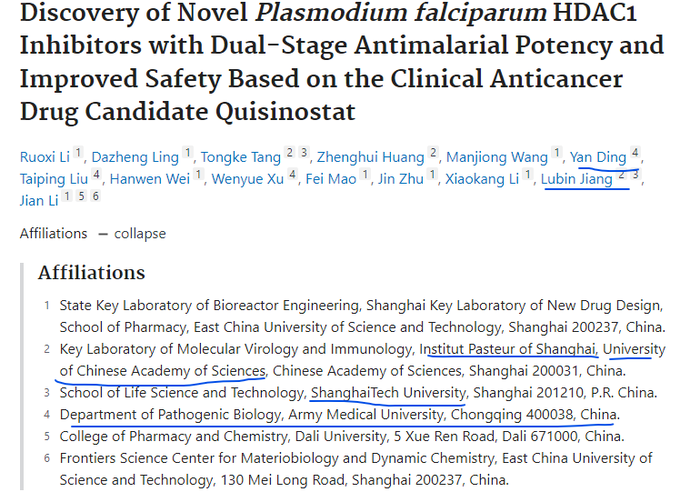Researcher | Doctoral Supervisor
Subject apparent genetics
Research group Plasmodium Epigenetics Research Group
telephone +86 021-54923072
Mail lbjiang@ips.ac.cn
address Room B106, New Life Science Laboratory Building, No. 320, Yueyang Road, Xuhui District, Shanghai
research direction
Using the original epigenetic gene editing technology as a means to study the epigenetic regulation mechanism that mediates the immune escape and multi-path infection of Plasmodium in the pathogenesis of malaria, explore new targets for the development of malaria vaccines and antimalarial drugs, and explore malaria prevention and control. new strategies for control.
Personal profile
Jiang Lubin is a second-level researcher and deputy director of the Pasteur Institute in Shanghai, Chinese Academy of Sciences. Graduated from Nanchang University with a bachelor's degree and master's degree, and a doctorate degree from Shanghai Institute of Plant Physiology and Ecology, Chinese Academy of Sciences. He then went to the National Institutes of Health ( NIH ), where he worked as a postdoctoral fellow and a research assistant, engaged in the research and development of malaria vaccines. Since 2012 , the Plasmodium Epigenetics Laboratory has been established at the Pasteur Institute of Shanghai, Chinese Academy of Sciences. In 2013 , he was funded by the "Hundred Talents Program" of the Chinese Academy of Sciences and was awarded "Excellent" in the final evaluation. He has successively served as Distinguished Professor of ShanghaiTech University, Executive Director of Parasitology Professional Committee of Chinese Zoological Society, and editorial board member of Chinese Journal of Parasitology and Parasitic Diseases. After returning to China, he successively presided over the National Science Fund for Distinguished Young Scholars, the National Key R&D Program "Protein Machine", the US NIH R01 Project, the National Foundation Committee ( NSFC ) -NIH China-US Key Project, the International Alliance of Science and Technology Organizations ( ANSO ) Key Project, the Chinese Academy of Sciences STS More than ten important scientific research projects such as regional key projects. He has published more than 40 SCI research papers , among which the corresponding authors are in Nature ( 2 papers), PNAS ( 4 papers), Nucleic Acids Research (1 ) and many other research papers published in international journals. A total of 6 national invention patents and international PCT patents have been applied for antimalarial drugs , of which a small molecule drug candidate has entered preclinical research. In 2019 , he was awarded the Advanced Individual of Shanghai Science and Technology System, and in 2020 , he was awarded the "Zhu Liyuehua" Award for Outstanding Teacher of the Chinese Academy of Science.
1. Deputy Director, Key Laboratory of Molecular Viruses and Immunity, Chinese Academy of Sciences ( August 2016 to present)
2. Distinguished Professor, School of Life Sciences, ShanghaiTech University ( March 2015 to present)
3. Director of the Council of Shanghai Institute of Major Infectious Diseases and Biosafety ( 2020 -present)
4. Standing member of the Parasitology Professional Committee of the Zoological Society of China ( October 2019 - October 2023 )
5. Editorial board member of "Chinese Journal of Parasitology and Parasitic Diseases" ( August 2018 - August 2023 )
6. Vice Chairman of the First Council of Artemisinin Science and Technology Alliance ( January 2019 - December 2022 )
He published paper with military scientist Yan Ding of PLA " Discovery of Novel Plasmodium falciparum HDAC1 Inhibitors with Dual-Stage Antimalarial Potency and Improved Safety Based on the Clinical Anticancer Drug Candidate Quisinostat".

No comments:
Post a Comment